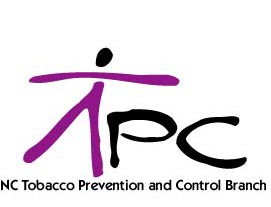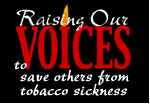"Work
is easier to carry if your heart is involved."
Eleanor Roosevelt

Make
every day the Great American Smokeout in N.C.
On Thursday, November 20, 2003 the North Carolina State Center
for Health Statistics (SCHS) and Tobacco Prevention and Control Branch
(TPCB) joined the forces to celebrate the American Cancer Society’s
Great American Smokeout event.
Quitters found camaraderie and support on November 20
when thousands of Americans avoided tobacco use for the day or for
good. For 26 years more smokers have kicked the habit during the Great
American Smokeout than any other day of the year.
Since one of the national Healthy People 2010 goals is
to encourage more quit attempts by adult smokers, this promotional
event creates much fanfare. For those who currently smoke and
want to quit the Great American Smokeout provides a great opportunity.
For those in NC in the field of tobacco control, our
task is to make every day a great day to stop using tobacco.
As more resources and programs become available, our task is to link
more people into these areas. Cessation efforts have expanded
greatly in NC.
This past summer North Carolina launched QuitNow NC,
promoting prevention, cessation, treatment and a smoke-free NC.
Two telephone quitline services for smokers trying to quit can be
accessed at (877)-44U-QUIT and for pregnant women (866)-667-8278.
There is no better time to kick nicotine dependence than
now.
In an effort to make more information about tobacco use
available to a wider array of people, the TPCB’s Surveillance and
Evaluation Team has generated a short report, which examines smoking
trends in North Carolina and the US as reported to the Behavioral Risk
Factor Surveillance System (NC BRFSS). The report can be found
at:
../../index.htm
More information on the 26th Annual Smokeout, quit plans,
and helpful tidbits on quitting can be found at: http://www.cancer.org
and
More information on the State Center for Health Statistics
and NC BRFSS can be found at:
http://www.schs.state.nc.us/SCHS/about/programs/brfss/index.html
Table of Contents
NC Tobacco Survivors
Available to Speak to Kids and Teens
No one is more familiar with the devastating effects
of tobacco use than survivors of tobacco illness and their love ones.
SAVE (Survivors and Victims of Tobacco Empowerment) is a statewide
organization formed to bring forth their stories. SAVE
encourages and trains survivors to effectively share their experiences
for prevention and advocacy efforts.
“We believe hearing the anti-tobacco message from a survivor
is a powerful method of emphasizing tobacco realities,” said SAVE
executive director Katherine Hampton. “Most of our speakers are laryngectomees
and speak with an electric larynx or the aid of a speech prosthesis.”
Sometimes a survivor actually shows students the permanent
hole in his/her throat that is used to breathe, as a result of throat
cancer. Students take these stories to heart and some will
choose not to use tobacco as a direct result of hearing a survivor‘s
story. Using SAVE survivors to work with youth in the schools can further
enhance the tobacco awareness programs already in place.
“Our survivors spend hundreds of hours every year traveling
around the state working with youth groups,” Mrs. Hampton said.
SAVE supports their efforts by covering expenses and providing
training. SAVE’s youth programs are funded by a grant from
the Health and Wellness Trust Fund Commission.
Contact SAVE at
info@tobaccosurvivors.org
Table of Contents
N.C.'s
Priority Populations Address Health Disparities

By Larry Gourdine
Director of Parity and Diversity, NC Tobacco Prevention
and Control Branch
In 2003 the North Carolina Health and Wellness Trust
Fund Commission funded two African American organizations, one Latino/Hispanic
organization and one Native American organization to address tobacco-related
health disparities. Each priority population grantee is to develop a comprehensive
statewide tobacco use prevention and control program that is evidence-based,
innovative and designed to reach youth in North Carolina.
The two African American organizations funded by the Health and
Wellness Trust Fund Commission are the General Baptist State Convention
and the Old North State Medical Society. The General Baptist State Convention
(GBSC) is a statewide non-profit organization that provides church-based
health and human service prevention programs that focus on youth and outreach
to community organizations. A key component of the GBSC tobacco
use prevention program is PHOTOVOICE, which trains African American youth
to document tobacco-related advertisements aimed at minors. PHOTOVOICE captures
personal testimonies about tobacco use in African American communities.
GBSC has conducted two regional youth summits, focusing on tobacco use
prevention and training across the state. For more information contact
Anita Holmes at 919 572-6374.
Old North State Medical Society, (ONSMS) is a professional society
representing the interest of African American physicians throughout
North Carolina. The ONSMS tobacco use prevention program, Empowered to
be Tobacco Free: Mobilizing African Americans for Tobacco Use Prevention
and Cessation, is geared towards African American youth age 12-18 and
physicians focusing on youth empowerment, leadership development, media
advocacy and media literacy. ONSMS has held statewide youth summits in
Raleigh and Winston-Salem, North Carolina. For more information contact
Thea Monet at (919)-680-0376.
El Pueblo, is a leading Latino/Hispanic organization in North
Carolina serving the unique needs of Latinos/Hispanics and newly arriving
immigrants coming into North Carolina. El Pueblo’s No Fomo tobacco use
prevention program is culturally appropriate and is designed to train
and developed the capacity of youth advocates to be leaders in the tobacco
movement. For more information contact Marisol Jimenez or Greg Maggiano
at (919) 835-1525.
The Commission on Indian Affairs, is a state agency with a mission
to serve the state’s American Indian population. The Commission on Indian
Affairs is working with the state’s 13 tribes and organizations to build
capacity and infrastructure of Native American youth to address tobacco-related
health disparities. The Commission on Indian Affairs Tobacco Use Prevention
Program focuses on education and capacity building partnering with the
faith community to reach Native American youth. The Not on Tobacco smoking
cessation program was developed and designed to address the unique cultural
and ceremonial use of tobacco within the Native American community. For
more information and how to get involved, please contact Missy Brayboy at
(919) 733-5998.
Table of Contents
Women and Tobacco Coalition for Health
Since 1993, the Women and Tobacco Coalition for Health (WATCH) has worked
to develop evidence-based smoking cessation resources and increase
the amount of cessation counseling services provided to women who use
tobacco in North Carolina. In 1995, WATCH developed the Guide for Counseling
Women Who Smoke, a training manual used to teach providers how to counsel
women who smoke. Since 1997, more than 1,500 providers and community
leaders have been trained in the model. The Guide was revised in May 2003
and continues to serve as a valuable resource across North Carolina and
the United States. WATCH has more than 40 members that include representatives
from state and local public health and community-based organizations,
public and private clinicians, and women's health researchers. WATCH
has recently distributed the NC Collaborative Survey on Smoking Cessation
During Pregnancy to all prenatal care providers in North Carolina. The
purpose of this survey is to help determine what services are being provided,
barriers for providing these services, and resources needed to increase
the amount of services provided to pregnant women. The results from this
survey will guide future initiatives of WATCH. For more information contact
Renée Douglas at renee.douglas@ncmail.net or 919-715-3089.
Table of Contents
Smoking
out the Truth II: The Politics of Tobacco Policy in North Carolina
On November 5 North Carolina
Central University hosted a forum to discuss the changing role of tobacco
in North Carolina. Guest panelists included: NC Representatives
H.M. Mickey Michaux and Jennifer Weiss; John Thompson of the American
Cancer Society; Leslie Brown, J.D. from the NC Office of Minority Health
and Health Disparity, and Dr. Adam Goldstein, of the UNC Department of
Family Medicine. Sally Herndon Malek of the N.C. Tobacco Prevention and
Control Branch served as a resource person for the panel.
Brown said that he witnessed the detrimental effects of tobacco on health,
as well as the economic benefits to his family on their tobacco farm during
his youth. He stated that tobacco has “interwoven” itself so intricately
within our society (i.e. politics, media) that to disrupt it would be a task
that he honestly did not know if our government was ready to do. But,
since tobacco use costs North Carolina approximately $4.8 billion in
direct medical and productivity losses annually, he said, government should
consider doing so.
Panelists discussed evidence-based interventions including increasing
the price of cigarettes and other tobacco products. Both Representatives
Weiss and Michaux discussed their support for legislation to increase
the price of cigarettes; having introduced bills last session to raise
the price by 75 cents and one dollar respectively. John Thompson
shared statistics about the effectiveness of a tobacco price increase on
reducing teen tobacco use, and referred the audience to the NC Alliance
for Health and the Southern Neighbors Policy Collaborative website at
http://www.savesouthernkids.org/
Panelists also discussed the need to eliminate secondhand smoke
from the environment. Secondhand smoke is a known human lung carcinogen.
Dr. Goldstein challenged students and faculty to creatively advocate
for tobacco tax as a source of revenue in a manner that is relevant to
them, for example as a means to raise revenue rather than increasing tuition.
He also urged students and faculty to protect their own health by advocating
for tobacco free dorms and buildings on campus with the deans and the
Chancellor. Tobacco free dorms and campus buildings are now
possible due to a bill that exempts these facilities from a law that requires
state controlled buildings to set aside 20% of space for smoking and that
preempts local governments from passing stronger nonsmoking policies for
public places.
In a discussion of political will to address tobacco, Michaux urged
the members of the audience to show up and take an active role in politics
by voting in elections.
One student complained that events such as this did not attract
media attention. “We’re here now,” responded a member of the audience.
“When we do show up there is no media coverage. Why isn’t there
any media coverage, but a home video camera?” The speaker was referring
to the NCCU’s Office of Learning Resource, which taped the session. Local
news media were invited, but did not cover the forum.
This event was brought about by a three-year grant from the American
Legacy Foundation to develop leadership and advocacy skills around tobacco
and health issues for students at historically black colleges and universities.
Table of Contents
Bumper Sticker of the Month
Seen in Raleigh –
“Keep your butts in the car,
the earth
is not your ashtray"
Table
of Contents
Urban Legends Exposed:
Nicotine Does NOT Cause Cancer
(Editor’s Note: As a regular feature in The
Voice Box, we will address Urban Legends about tobacco that we hear
circulating in North Carolina and give the real information to correct
them. So go ahead, ask a silly question, and let us know if you hear
something that you are not sure is true. )
Tobacco is rapidly becoming the world’s number one killer.
The World Health Organization (WHO) estimates more than four million
deaths each year result from tobacco and this number is expected
to rise to Ten million in the next two decades. Persistent misconceptions
cloud the issue. One of the more common misconceptions is that
nicotine causes cancer.
Tobacco smoke contains over 4,000 chemicals, of which nicotine
is just one. In addition to tar, there is also carbon monoxide,
ammonia and arsenic. At least 43 of the chemicals in tobacco
smoke are known to cause cancers of the lungs, throat, mouth, bladder,
and kidneys. Tobacco smoke also contributes to a number of other
cancers.
Although nicotine is the ingredient responsible for addition
to tobacco products, it is some of the other compounds in tobacco
smoke that are primarily responsible for the harmful effects of smoking
tobacco. There is little evidence to indicate that nicotine itself
can cause cancer.
Sources: NIDA Research Report- Nicotine Addiction, National
Institute on Drug Abuse (NIDA). NIH Publication No. 01-4342, 2001;
and, New York Smoker’s Hotline Fact Sheet (accessed Nov 26, 2003; update 09/04/2007: file no longer available at former site)
If anyone else out there has more specific information
we would love to share it with everyone.
If you would like to submit a silly question or let us know if you hear something
that you are not sure is true, send it to Julie Helsabeck
and we will consider it for a future issue.
Table of Contents
(Editor’s Note: If you have a web
site you would like to recommend, send it to Julie Helsabeck, and
we will consider it for a future issue.)
www.CHAMPSS.org
Sponsored by the
Campaign for Tobacco Free Kids, this site is for kids and teens that
want to encourage their parents to quit smoking.
CHAMPSS stands for Children Helping And Motivating Parents
to Stop Smoking.
- Kids can select one of several
email cards to send their parents to support them in quitting smoking.
- “Tell a Friend” feature to allow
you to send an email recommended the site to a friend.
- Real stories from smokers who have
quit and their kids who have helped them!
Bookmark the site for future
reference!
www.CHAMPSS.org
Table of Contents
FYI: Recommended Resources
1. "Tobacco Control for Clinicians Who Treat Adolescents," A Cancer
Journal for Clinicians
James D. Sargent, MD; Joseph R. DiFranza,
MD. Volume 53, Number 2, March/April 2003. pages 102-123.
Recommended by Sally Herndon Malek, MPH, Branch Head, NC Tobacco Prevention
and Control Branch.
Follow link to read in entirety: CAonline.AmCancerSoc.org
2. Campaign for Tobacco Free Kids: Updated "Saving Lives" Video
TPCB has just received an updated version of "Tobacco Prevention: Saving
Lives & Saving Money" CD. This CD contains an electronic
version of the video, which is a shorter version. It also
contains updated brochures, fliers, and fact sheets. For more/supplemental
information and to request a copy, please visit Campaign for
Tobacco-Free Kids web site: www.tobaccofreekids.org
Table of Contents
Upcoming Events:
January 2004 - March 2004
January 16, 2004
Question Y East Adult Leadership Training
207 SW Greenville Blvd, Greenville,
NC 27834-6907, Tel: 1-252-355-5000 Fax: 1-252-355-5099
www.hilton.com
Contact: Steve Johnson at 910-790-9949 or stevejohnson@whatswhat.org
or Terry Quinn at 252-439-8600 or
terryquinn@whatswhat.org
January 24, 2004
Girls Conference for Guilford and Alamance
Location and Time TBD
Contact: Michelle
Gill at mgill@co.guilford.nc.us or Lynn Innman at
linman@acmhddsa.org
January 26, 2004
NC Alliance for Health
American Heart Association 1:30-3:30
Contact: Betsy
Vetter at
919-463-8328
or betsy.vetter@heart.org
February 21, 2004
Media Literacy/Advocacy Training I
Location and Time TBD, North Eastern
Contact: Steve
Johnson at 910-790-9949 or stevejohnson@whatswhat.org
or Terry Quinn at 252-439-8600 or
terryquinn@whatswhat.org
March 12-14, 2004
Youth Leadership Institute
Sheraton Imperial, RTP
Contact: Dan
Mulvihill at Dan.Mulvihill@ncmail.net
or 919-715-4395 or
Barbara Clark at Barbara.Clark@ncmail.net
or 919-733-1355
March 15, 2004
NC Alliance for Health
American Heart Association, 1:30-3:30
Contact: Betsy
Vetter at
919-463-8328 or betsy.vetter@heart.org
March 20, 2004
Media Literacy/Advocacy Training II
Location and Time TBD, South Eastern
Contact: Steve
Johnson at 910-790-9949 or stevejohnson@whatswhat.org
or Terry Quinn at 252-439-8600 or
terryquinn@whatswhat.org
Table of Contents
If you have feedback
or comments please let us know, OR you can contribute your
own story about tobacco prevention and control in N.C. Please
send to
Julie Helsabeck.




